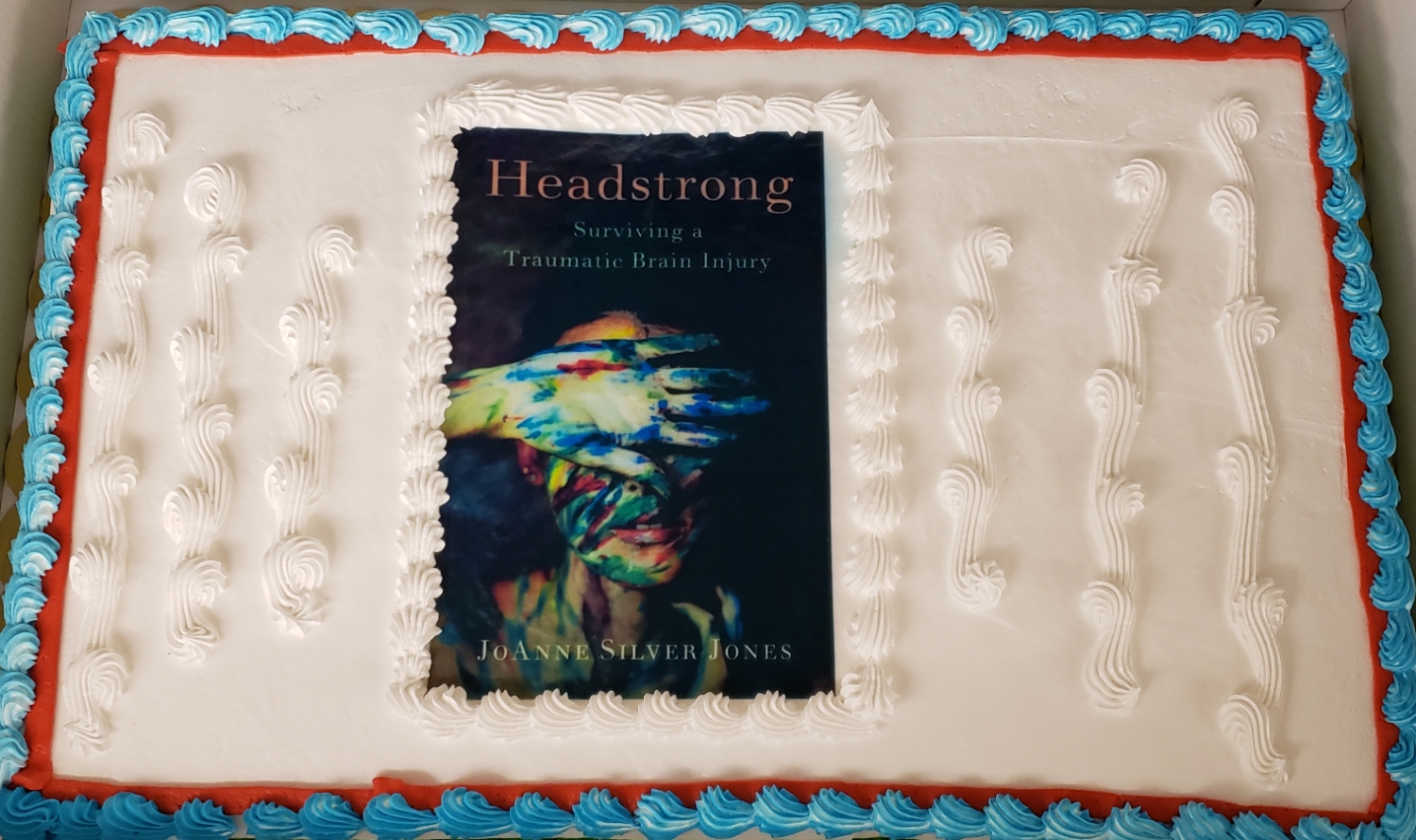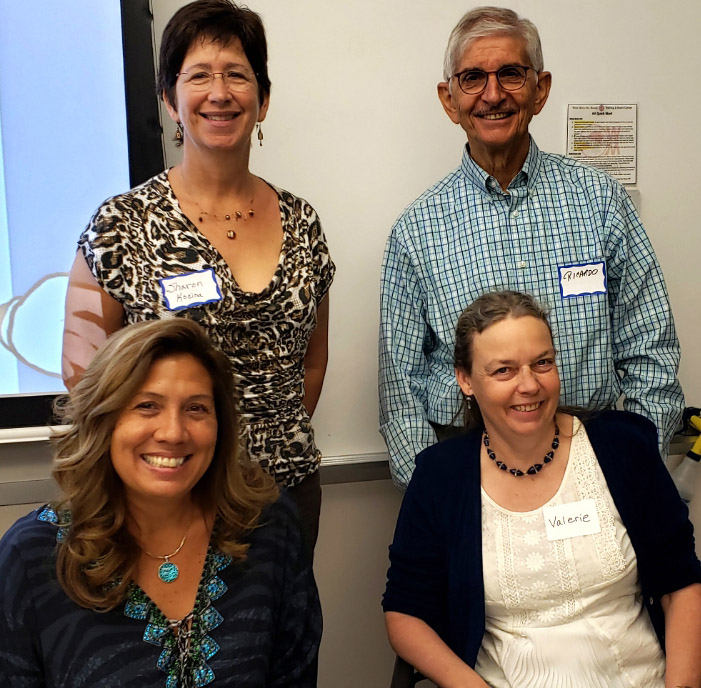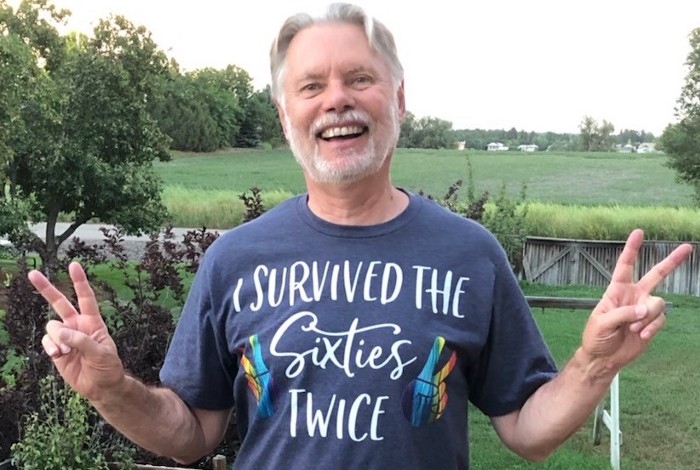13 Keys to Re-empowerment During the Pandemic
Gayann 2020-08-04T04:32:15+00:00 June 25th, 2020|Blog|
13 Keys to Re-empowerment During the Pandemic
Getting Hit, Getting Up, Moving Beyond and Making a Difference
To describe the year 2020 as vexing, exasperating and terrifying is an understatement as the coronavirus pandemic remains a deadly cloud over our everyday lives. Add in a traumatic brain injury and the anxiety can be unbearable at times.
However, Joanne Cohen, vice president of the Brain Injury Hope Foundation, gave mTBI survivors 13 rays of hope during the first virtual Zoom Survivor Series – Getting Hit, Getting Up, Moving Beyond: 13 Keys to Re-empowerment During the Covid-19 Challenge, on June 26, 2020.
“How can we re-empower ourselves during this time?” Cohen asked. “Acceptance, adjustment and compassion. It’s about how we respond. We have the power to advocate for ourselves. I’m sharing with you today what trauma and adversity has taught me about resilience.”
Cohen, who just published the book “Getting Hit, Getting Up, Moving Beyond: My Journey Through Brain Injury,” stressed that all these keys may not work for everyone, but to take away what will work in your life and during your recovery. To purchase Cohen’s book
One of the key steps (No. 10) is finding the “golden nugget” in times of turmoil, Cohen explained, and asked the Zoom participants to add their silver lining to facing a pandemic while recovering from a mTBI.
Jennifer responded that she was prepared for the isolation that came with coronavirus pandemic because while recovering from an accident she was already living in isolation. Julie learned to connect with people from home via technology, and Russell said his mTBI recovery made him better able to handle the Covid-19 pandemic. While Susan said an attitude of gratitude has helped her be resilient. Francesca added that she is learning to take better care of herself.
Acknowledging what is happening (Key No. 1) and taking small steps to address the stress are essential ways to thrive in times of uncertainty, Cohen said. “Covid-19 has rocked our world. It’s how we choose to respond to it. (Key No. 12) We need to reframe how we react and think.”
Cohen then quoted Jacob Meyer, a therapist with Integrated Health Systems of Denver.
“Dealing with uncertainty is opposite of routine. Human beings tend to thrive in routine with smaller breaks in uncertainty. Routine allows us stability… Coronavirus has brought uncertainty on multiple levels … Understand that this stress is a normal occurrence, everyone is experiencing it to some degree.”
The isolation and lack of control everyone is experiencing during the pandemic are familiar to the mTBI community. Meyer was quoted, “shame, fear, self-criticism all thrive in states of isolation. It is natural to feel that way.”
Dealing with grief is a big key to thriving during the pandemic, as we have lost control of our lives.
“What is not healthy is stuffing these feelings down,” Cohen said. “Grief manifests itself and affects the physical, emotional, cognitive and behavioral aspects of one’s life. Give yourself permission to grieve. By addressing grief it will be easier to recover.”
For more on grief and counseling after a brain injury, here is a link to the blog on our Survivor Series Counseling after a brain injury.
Key No. 2 Focusing on our ability and not our DISability is vital Cohen stresses. “We are all too aware of our isolation and limitations. This is new learning for all of us. … As a group we are used to challenges and stepping up to the plate to protect ourselves and others.” It’s about finding that golden nugget Cohen suggested at the start of the seminar.
Living your life to the fullest (Key No. 3) can help us during these intense times. “This is what it is, and it’s how we choose to react,” Cohen said.
Self-care techniques are helpful and may include playing with your pet, taking a walk to a new park or exploring your neighborhood, playing online games, learning a new hobby. It’s about finding positive ways to fill the gaps while nurturing your soul.
Key 4 is being your own advocate and No. 5 is trusting the process and being creative.
“If it’s meant to be it’s up to me,” Cohen said. “Be resourceful and advocate for yourself or find someone who will be your advocate. Accept one day at a time. There is transformation in the midst of Covid-19 – look at how Mother Earth is beginning to heal. Find a support group of like-minded individuals.
“This too shall pass,” Cohen continued. “Be creative. Reframe the process. I had a birthday during Covid, and we changed how we celebrated. We read cards over Zoom. I met people in parking lots for coffee and dinner. It was great. And I turned my garage into a meeting place where we can socialize while maintaining 6 feet.”
Developing a support team and thriving is Key No. 6. Kevin said he is leading a TBI support group where he shares what he has learned. You can contact Kevin at [email protected]
Cohen noted this is a great example of not waiting for others to reach out to you.

BIHF Vice President Joanne Cohen urges brain injury survivors to look for the “golden nugget” when dealing with adversity.
Using masks, staying at home and practicing social distancing are examples of Key No. 7 Move into the world safely. “Be mindful, and do what’s best for you and others,” Cohen said.
Ask for help is key No. 8. “It takes a strong person to ask for help,” Cohen explained. “You could use the NextDoor app to ask people to go to the grocery store for you. … surrender and lean into this. You can’t assume people know what you need.”
Compensation is the crux to No. 9 Compensate! Compensate! Compensate! “You can’t do everything the way you used to do it so find ways to compensate,” Cohen said, then gave her birthday celebration as an example of compensating during Covid-19.
Julie stated she reads bedtime stories to her grandchildren over Zoom. Vicki turns off the news and social media when she feels overwhelmed.
No. 10 goes back to being positive – Look for silver linings. Those golden nuggets. Darren said he is enjoying more family time during the pandemic. Susan is focusing on her art projects and is writing more, while Vicki says working from home is a blessing because there’s less noise and light. And Jeffrey said the human race needs to prioritize its thinking and we will come out wiser.
Helping others IS helping yourself is Key 11. Cohen noted that while homeschooling your children you can discover how your child learns, along with finding a new appreciation for teachers. “Give to give instead of giving to get,” she said.
No. 12 Your Journey, Your Life: You Choose How Your React or Respond to It is about adapting, adjusting to change, surrendering, leaning in and knowing it’s OK to have a “bad hair” day, Cohen explained.
Susan said she is sewing masks as her way of responding to the pandemic.
No. 13 is Resiliency is a Key to Survive AND Thrive. “It’s an inconvenience for all of us,” Cohen said.
Staying positive, having structure to your day, getting and staying connected to others are just a few of the ways to implement the baker’s dozen of keys to moving beyond the pandemic while recovering from a brain injury.
By Eliza Marie Somers

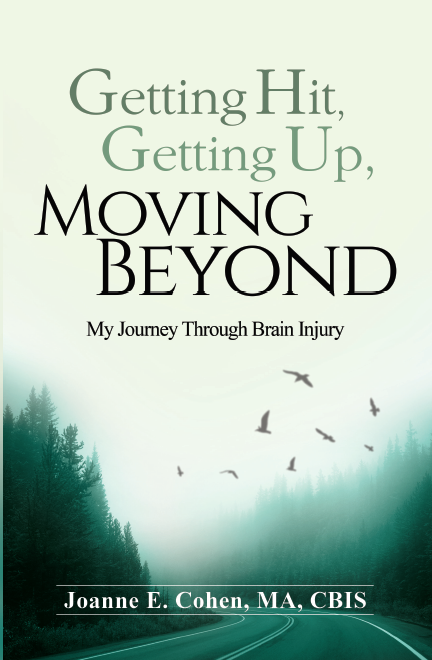
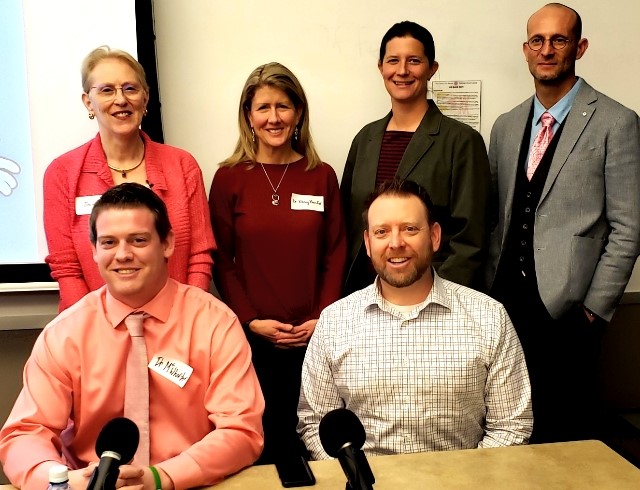
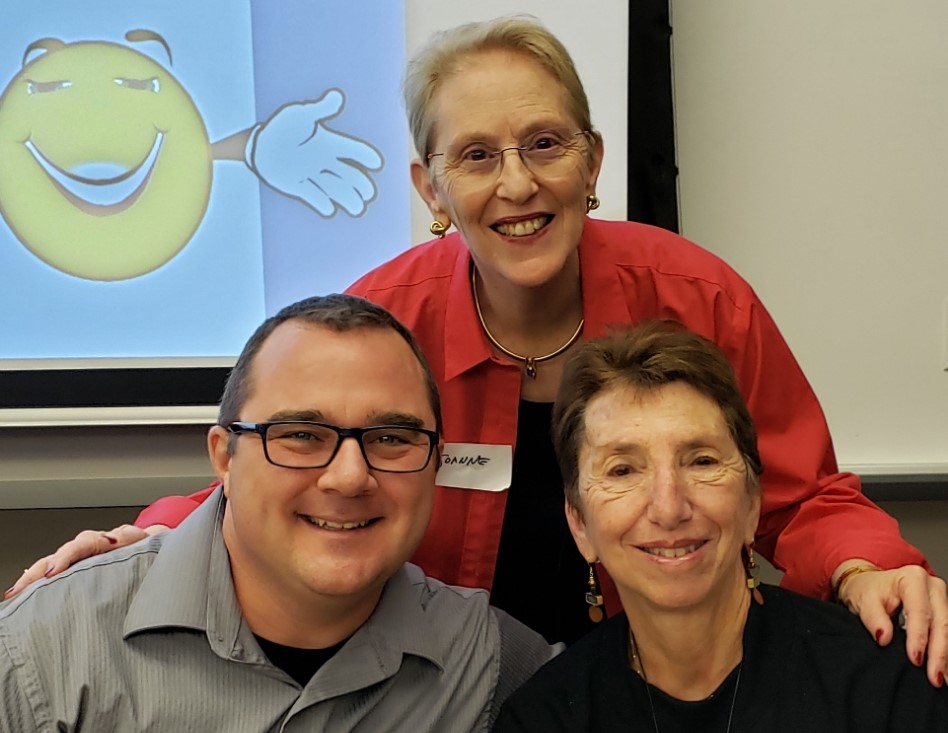 BIHF vice president Joanne Cohen, back, welcomes Jeffrey Therrian and Dr. JoAnne Silver Jones to the January 2020 Survivor Series Luncheon.
BIHF vice president Joanne Cohen, back, welcomes Jeffrey Therrian and Dr. JoAnne Silver Jones to the January 2020 Survivor Series Luncheon.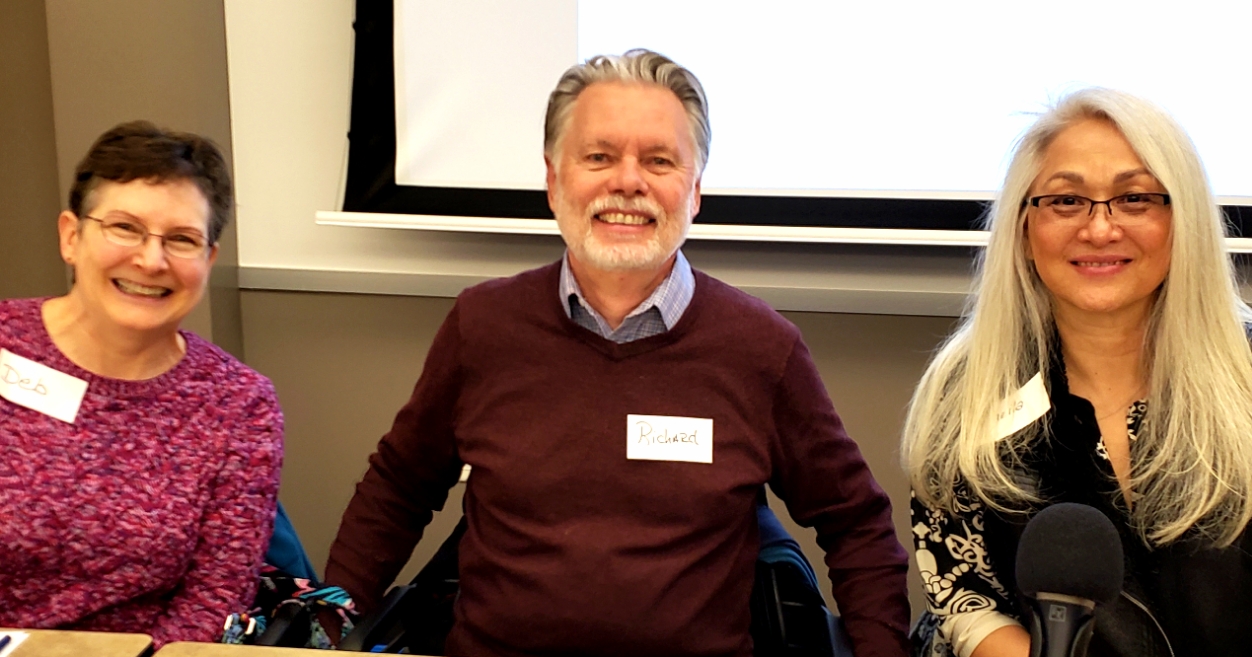 Deb Finegold, left, Richard Garde and Shelia Traister are more than happy to share their tips at the BIHF January 2020 Survivor Series Luncheon.
Deb Finegold, left, Richard Garde and Shelia Traister are more than happy to share their tips at the BIHF January 2020 Survivor Series Luncheon.